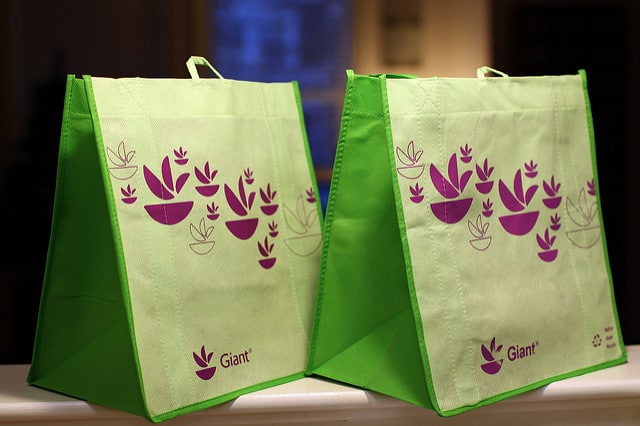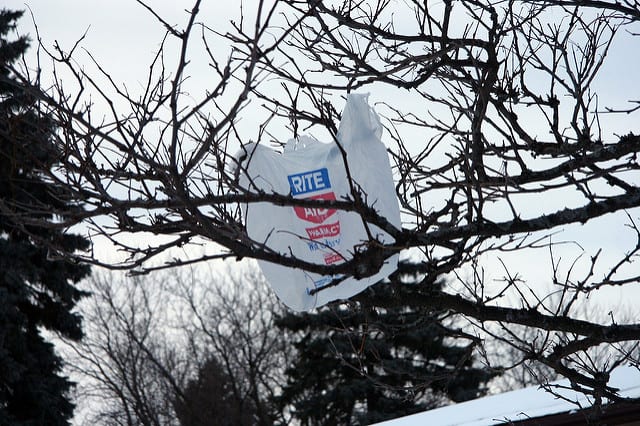Using less resources and producing less waste is not only something for big corporations and factories to worry about. Each of us can make a huge difference in how we impact the environment around us. We can continue to use excessively and create billions of pounds of waste each year, or we can make changes to adopt a more environmentally friendly lifestyle.
Plastic bags are not easily decomposed and contribute to the degradation of the environment. A plastic bag can take from 15 to 1,000 years to break down, depending on the environment. Moreover, the cost of recycling plastic bags outweighs their value. This is another reason why most of the plastic bags find their way to landfill sites. This results in a huge pile of garbage that can be seen across the city, releasing a foul smell throughout the day and serving as distraction for the tourists.
It’s high time for us to use alternative sources so as to reduce the impact of plastic bags on the environment. One such change is to ditch plastic bags altogether and use reusable bags.
40 Amazing Reasons to Switch to Reusable Bags Today
Here is a look at 40 reasons why plastic bags are not ideal.
1. Costs
While some stores still offer free plastic bags, most now charge around five cents per bag in the United States and Canada. Other countries, such as Ireland, now have a 15 cent charge per bag. A few dollars for reusable bags that last for years, or 25 to 50 dollars for plastic bags each year? You do the math!
2. Production
A lot of oil and natural gas go into the production of plastic bags, which are not recyclable. Choosing reusable bags saves on these non-renewable resources and protects the environment.
3. Recycling and Garbage Costs
Even if you use paper bags, it costs money to recycle them. Similarly, plastic bags have to be taken into landfills and processed each year.
4. Degradation
If a plastic bag sits in a landfill, it will take around 1,000 years to degrade properly. Yes, ONE THOUSAND years and plastic Is (Almost) forever. They continue to break down into small toxic parts, which is bad for the environment.
5. Excess
Everywhere you go, you will see plastic bags. Sometimes they are lying on the street or slipping out of garbage cans. They are a great symbol of our rapidly increasing consumerism.
6. Environmental Impact
If you believe in global warming or climate change, you are actively contributing to this phenomenon each time you use a plastic bag. In fact, paper bags are even worse for the environment because you are cutting down trees to make them and using resources to recycle them.
7. Petroleum
It takes the same amount of petroleum to drive one kilometer in your car as it takes to make seven plastic bags. This is another example of unnecessary waste because reusable bags are just as effective as plastic ones, if not more.
8. Landfills
We already talked about the problems with plastic bag decomposition, but think about how much space they take in landfills. Many cities and countries already have issues with landfill space, with plastic bags only adding to the problem.
9. Ecosystem
The ecosystem around us is distributed by plastic bags because they often fly away into trees or other animals’ homes. Sometimes animals even try to eat these bags, thinking they are part of nature, which leads to their death.
10. Marine Life
Incredibly, around 100,000 marine animals perish every single year because of plastic bags. Some of the marine life most impacted are water birds and sea turtles, who often mistake them for food or get tangled up in them and cannot escape.
11. City-Wide Litter
Plastic bags rarely stay where you put them. Even if you are careful about dumping them in a trash can, they will escape when the can is opened, and the wind is blowing. This leads to bags all around cities and towns, making the area aesthetically unappealing.
12. No Recycling
Plastic bags are rarely recycled because of the associated costs. It takes around $5,000 to recycle just one ton of these bags, while that amount only sells for around $30. No one is going to waste that much money recycling these bags, which is why they are always thrown out.
13. Contamination
Even if you try and recycle these bags, you are risking contamination when certain plastics mix together.
14. Oil Politics
Tired of your country bowing to foreign interests, or interfering in their conflicts, because of oil? Plastic bags are a direct reason for this political situation because of how much petroleum is used to create them. More than ten million barrels of oil per year being used to make plastic bags in the US alone!
15. Never-Ending
Think about this for a second: every plastic bag you ever touched or used is probably still lying around somewhere on this planet. It might not be near you, but it is somewhere on the planet you call home.
And here are 15 reasons why you should switch to reusable bags immediately!
16. Long-Lasting
A reusable bag is not going to tear for a long time. These bags are incredibly durable. You can probably use them to carry your groceries for years before needing a replacement.
17. Environmentally Conscious
It is easy to tell other people how to conserve energy and resources, but a lot harder to follow through yourself. Switching to reusable bags is your way of following through on your beliefs.
18. Discounts and Incentives
Many stores offer discounts and other incentives to shoppers who use these bags. While you may only save a few cents per trip, this adds up to a lot of money in a few years.
19. More Efficient
When checking out at the grocery store, it is a lot quicker to put your items into a reusable bag. They carry more items and retain their shape. Even when you are taking out and putting away your items at home, you will save time.
20. Comfort
If you have to walk a few blocks from the grocery store, you will often notice your fingers in a lot of pain by the time you get home. This is not the case with reusable bags because they are a lot more comfortable to carry, especially for long distances.
21. Items Do Not Fall Out
The worst feeling after a grocery-store trip happens when your bag rips and items fall out on the sidewalk. Sometimes an item breaks or gets damaged, while other times, it is just frustrating and inconvenient. This never happens with reusable bags!
22. Less Germs
Do you know where plastic bags have been before they enter your home and touch your food? No. With reusable bags, you know exactly where the bag is sitting, which leads to far fewer germs.
23. Cleanliness
Expanding on the previous point, reusable bags are easy to wash or wipe down with a damp cloth. This keeps them clean, even if food gets on them on occasion.
24. Leaks
It is not uncommon for ice-cream to melt and leak out of the container or the juices from vegetables to seep out of their plastic bags. When this stuff gets on your car seat, it is a problem to clean. With reusable bags, all leaks stay within the bag.
25. Multi-Purpose
You can use these bags for anything, such as storing old clothes and papers around the house or keeping dirty clothes in one place before adding them to the laundry machine.
26. Education
This is often overlooked, but seeing someone use these bags makes others want to join in. It becomes more socially acceptable to care about the environment.
27. Less Bags
Reusable bags can carry a lot more items than a plastic bag, which means less hassle when you have a big load of groceries. Instead of ten different bags, you probably only need a few reusable bags to get the job done.
28. Easy to Store
Stack the bags up on top of each other, and keep them in the corner of your pantry or a kitchen drawer. This way, you can easily access them before your weekly grocery trip.
29. Recycling
If you need to take a bunch of cans and bottles to your local recycling spot, use these bags to transport the items. This is a lot easier than picking up a few items at a time and better for the environment than using plastic bags.
30. Sorting
If you can carry fewer bags out of the grocery store, it is easier to store your items. Use one bag for perishables, while another can contain all your packaged groceries.
31. Clean Cities, Parks, Oceans and Beaches
As plastic bags are so lightweight, wind easily blows them out of trashcans, refuse trucks and landfill sites to litter the landscape. They are likely to fly away, settling in trees, blocking storm drains, and cluttering beaches. If we replace plastic bags with reusable bags, our surroundings will gradually become clean and beautiful once again.
32. More Recycling Option
Single-use plastic bags are not normally recyclable as the cost to recycle plastic bags outweighs their value. So most recycling facilities will not take them. But many reusable bags are recyclable. These reusable bags can be turned back into something useful at the end of their life instead of going to landfill.
33. Waste of Public Money
Public agencies in California alone spend more than $300 million on cleaning up coastal litter every year! The amount spent cleaning up plastic litter and sending waste to landfill uses up valuable public funds that could be spent on something more socially useful, such as education or healthcare.
34. Keep Oil in the Ground
Plastic bags are manufactured from oil, and discarding those means less fossil fuel will be used. This will not only reduce carbon emissions but means this valuable, non-renewable resource will last longer.
35. Plastic Soars the Oil Price
More plastic consumption means more oil consumption and higher prices for oil. A reduction in plastic bag consumption, combined with overall reductions in plastic use, can help drastically reduce oil consumption and, therefore, lower prices.
36. Carbon Footprint
Producing plastic bags requires energy. Transporting bags to the store burns through more energy. Much of this energy is obtained by burning hydrocarbons, which releases carbon dioxide and other greenhouse gasses into the atmosphere. Choosing reusable bags means the manufacturing of fewer plastic bags, which will cut carbon dioxide emissions. Here the contribution may seem small, but to avoid catastrophic climate change, every little effort counts.
37. Flooding
Plastic bag litter clogs drain, storm sewers and have caused or contributed to major floods around the world. Fewer plastic bags in the environment mean improved drainage systems, less flooding, less water-borne disease and better sustainability for vulnerable communities.
38. Sustainable Jobs and Economic Growth
Reusable bags are made from sustainable crops such as bamboo or jute. Buying them can help farmers and textile workers to support themselves and their families. In less-developed nations, demand for reusable bags can offer a valuable new source for earning revenue.
39. COVID-19
According to Johns Hopkins University, COVID-19 doesn’t survive on a soft surface like fabric. It does survive on hard surfaces and on plastics. Think before you use plastic.
40. Soil and Water Pollution
Plastics are a rapidly growing segment of municipal solid waste (MSW), according to the Environmental Protection Agency, which has been collecting plastic bag statistics for more than a decade. Roughly 2% of plastic bags are recycled in the United States. The rest are left to live indefinitely in landfills or decompose in our oceans, where they leech toxins into the water and soil.
In addition to petroleum, the manufacture of plastic bags uses dyes, plasticizers, and other toxic chemicals containing lead, cadmium, and other toxins that leach out into the environment, and many of the byproducts of their manufacture end up in the environment as pollution.







